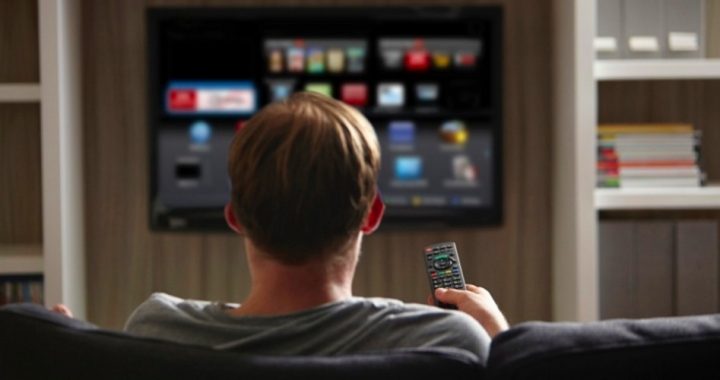
It’s one thing to watch television; it’s another thing altogether for your television to watch you. Unfortunately, that is what is increasingly happening. As Internet connected devices become more commonplace, more and more of them are designed to infringe on users’ privacy. The newest Smart TVs are some of the worst offenders and the problem is growing.
The New American has written about this before — when Samsung’s SmartTVs were revealed to be spying on users via their integrated cameras, microphones, and Internet connectivity. We wrote then that Samsung’s SmartTV “monitors the content consumers view so as to make ‘recommendations’ of other relevant content that they may find interesting. This is a buzz-phrase for advertisement-based programming.” Now Vizio is following suit.
Vizio has introduced a new — and largely unknown — “feature” with its Internet connected TVs. The “feature” does not benefit users at all but offers a possible revenue stream for the company. The new feature of the Smart TVs offered by the company is called “Smart Interactivity.” It monitors the users’ viewing habits and reports back to the company so that it can sell that information to advertisers. By capturing your IP address and linking that to any other connected devices (like your laptop, tablet, and smartphone), the company is able to offer advertisers a comprehensive profile of you that permits them to reach out to you on all your devices.
The “Smart Interactivity” feature of Vizio’s Smart TVs is turned on by default and users who wish to live without it must “opt out.” This is unlikely, since the company does not make them aware of the feature or what it does. The company has only addressed “Smart Interactivity” in the form of statements that downplay its risks.
As Pro Publica reported:
In a statement, Vizio said customers’ “non-personal identifiable information may be shared with select partners … to permit these companies to make, for example, better-informed decisions regarding content production, programming and advertising.”
There are several problems with this statement, not the least of which is that the data collected is “non-personal identifiable information.” It is not much of a leap to envision that knowledge of your IP address could allow someone to learn your physical address and actual identity. There are companies that specialize in just that. Other companies, while not making it their bread and butter, have become increasingly focused on tying IP addresses to individuals. Again, from Pro Publica:
IP addresses can increasingly be linked to individuals. Data broker Experian, for instance, offers a “data enrichment” service that provide “hundreds of attributes” such as age, profession and “wealth indicators” tied to a particular IP address.
If the “Smart Interactivity” of Vizio’s Smart TVs is combined with other underhanded tactics used by advertisers, even more of the personal identifiable information of users can be made part of the surveillance culture. In a recent report by Ars Technica, it was revealed that advertisers are using “inaudible, high-frequency sounds to surreptitiously track a person’s online behavior across a range of devices, including phones, TVs, tablets, and computers.” As that report says:
The ultrasonic pitches are embedded into TV commercials or are played when a user encounters an ad displayed in a computer browser. While the sound can’t be heard by the human ear, nearby tablets and smartphones can detect it. When they do, browser cookies can now pair a single user to multiple devices and keep track of what TV commercials the person sees, how long the person watches the ads, and whether the person acts on the ads by doing a Web search or buying a product.
As The New American previously reported on the spying features of Samsung’s SmartTVs, “The chain of privacy/security is only as strong as its weakest link, and there are a lot of links in the SmartTV chain.” With voice recognition, on-board cameras and microphones, Internet connectivity, and now “Smart Interactivity,” one is left to wonder why anyone would want one of these devices in their homes. It is one thing for a TV or phone or any other device to be “smart.” It is too much for it to be smart and possibly evil.
In the last couple of years, many (if not most of) Americans have become at least somewhat aware of the surveillance being conducted on them by government agencies, and this has led to a growing concern. The surveillance conducted by corporations for the purpose of advertising should be no less disturbing. Each new tactic brings its own risks, including the ability for any or all of these techniques to be exploited by governments or others for their own purposes.
In the surveillance culture that permeates modern society, this is yet another step toward the building of a panopticon society where the concepts of privacy and liberty are meaningless refections of an idea whose time has come and gone. Unless people want to live in a society where all actions, conversations, and interactions are monitored, now may be the time to consider the direction of society as it related to the “Internet of things.” Otherwise, the surveillance culture will be as much a part of the American mind as is the welfare culture. As Thomas Paine wrote in the introduction to Common Sense, “A long habit of not thinking a thing wrong, gives it a superficial appearance of being right.” The generation that grows up with this type of “Smart Interactivity” and surreptitious advertising may well think them normal. Or just not think about them at all.
Americans who value freedom need to use their purchasing power to bring pressure to bear on manufacturers and developers and convince them to create products that are both feature-rich and freedom-friendly.
(SmartTV is a trademark of Samsung. This article uses the term Smart TV to refer to all TVs that connect to the Internet and uses SmartTV only when referring specifically to the product made by Samsung.)




